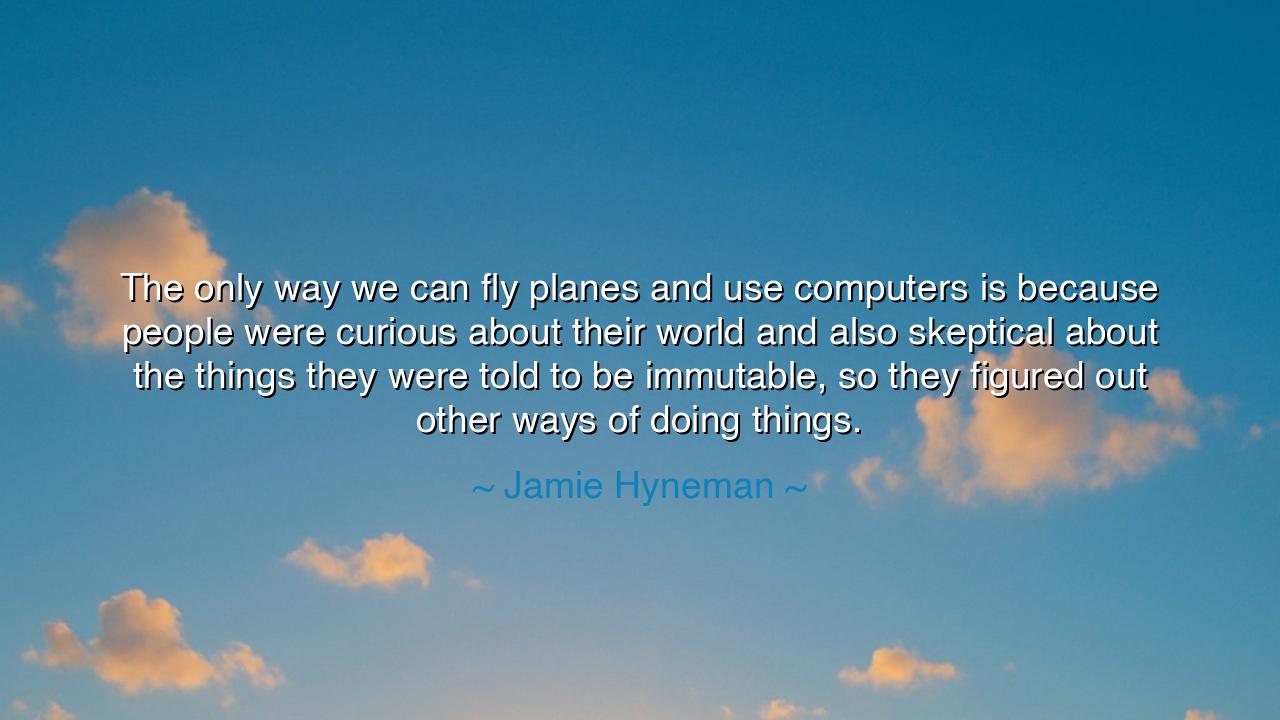
The only way we can fly planes and use computers is because
The only way we can fly planes and use computers is because people were curious about their world and also skeptical about the things they were told to be immutable, so they figured out other ways of doing things.






The words of Jamie Hyneman — “The only way we can fly planes and use computers is because people were curious about their world and also skeptical about the things they were told to be immutable, so they figured out other ways of doing things.” — ring like a hymn to the restless spirit of humankind. Within these words lies the eternal rhythm of progress: curiosity and skepticism, twin forces that drive the wheel of discovery forward. They are the fire and the chisel — curiosity ignites imagination, and skepticism carves truth from illusion. Without them, civilization would still be bound to the earth, its wings folded, its mind asleep.
From the earliest days, the ancients taught that wonder was the beginning of wisdom. The Greek philosopher Socrates questioned everything — not out of rebellion, but out of reverence for truth. He understood, as Hyneman does, that to accept the world as unchangeable is to surrender one’s birthright as a creator. It was curiosity that made humanity gaze at the stars, and skepticism that made it refuse to believe they were gods. From this sacred tension between faith and doubt was born science — the art of seeking what is, rather than what we are told must be.
The origin of Hyneman’s reflection lies in the heart of invention itself. As an engineer and co-host of MythBusters, he spent his life questioning assumptions — asking “what if?” and “why not?” in a world that often says “because that’s the way it is.” His experiments, whether humble or grand, were not about spectacle alone; they were acts of philosophy in motion. He reminds us that every great achievement — from the airplane to the computer — began when someone dared to disbelieve what was “impossible.” His words are not merely praise for curiosity, but a call to arms for every generation to reclaim the courage of questioning.
History is filled with such rebels of reason. When the Wright brothers stood on the windy dunes of Kitty Hawk, the world laughed at their dream. Learned men declared flight a fantasy, an insult to nature itself. But the brothers, guided by childlike curiosity and disciplined skepticism, tested, failed, and tried again. They refused to bow before the so-called laws of impossibility. And when their fragile craft finally lifted from the sand, it carried more than their bodies — it carried the proof that truth yields only to those who doubt its limits.
So too was it with Alan Turing, whose curiosity about numbers and machines led him to envision the modern computer. In a world that could not imagine a thinking machine, Turing believed. His skepticism toward convention — his refusal to accept the boundaries of mathematics as final — gave birth to a new era. The same spirit that questioned the heavens now questioned thought itself. And from that defiance, the digital age was born. It was curiosity that imagined, skepticism that built, and courage that endured.
Hyneman’s words remind us that progress is not born from comfort, but from discontent with the ordinary. The ancients built temples and empires, but it was the thinkers — the questioners — who built knowledge. To be curious is to look at the world not as a fixed structure, but as a living question. To be skeptical is to challenge the answers that chain our potential. When these two qualities unite, they form the heart of invention — a force that lifts humanity from darkness into light, from obedience into understanding.
Yet, there is a moral duty in this freedom. Curiosity without conscience becomes recklessness, and skepticism without humility becomes arrogance. The wise must question not to destroy, but to improve; not to mock, but to reveal. As Hyneman suggests, curiosity and skepticism are not weapons against truth, but instruments for uncovering it. The seeker must temper boldness with wisdom, for the goal of questioning is not rebellion for its own sake, but the liberation of insight — a truth that serves life, not ego.
So, my children, remember this lesson: never stop wondering, and never stop questioning. When the world tells you that something cannot be done, ask, “Why not?” When tradition claims authority, let your mind test its foundation. For every leap forward in history — every engine, every equation, every revelation — began with a whisper of doubt and a spark of curiosity. Do not let that flame die within you. The impossible yields only to those who are brave enough to disbelieve it.
And thus, the wisdom of Jamie Hyneman becomes timeless: that our greatest progress is born not from certainty, but from the courage to ask — and the persistence to find. Curiosity opens the door; skepticism ensures it leads to truth. Together, they are the wings by which humanity learns to fly — not only through the sky, but through the boundless expanse of possibility itself.






AAdministratorAdministrator
Welcome, honored guests. Please leave a comment, we will respond soon